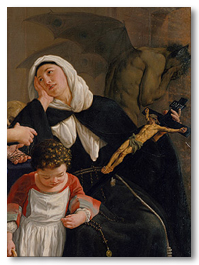Saint Margaret of Cortona
- REV. EMMERICH VOGT, O.P.
Saint Margaret of Cortona is an inspiration for all those in recovery who have come from homes where a step-parent resented having to care for the children of the new-found spouse.
 |
|
St. Margaret of Cortona
1247-1297 |
This is very common today where people divorce and remarry, bringing their children into the relationship with a new spouse. This is especially difficult for parents who are more concerned with spousal relation ships than with the welfare of their own children. Such parents are often ignorant of the specific behaviors and dynamics inherent to divorce and step-family living. Such was the case with Margaret.
She was born in 1247 in Tuscany, the daughter of a farmer. Her mother died when Margaret was seven years old. Her father remarried. The stepmother considered Margaret a nuisance. As is very common today among children who feel unwanted, Margaret was easily drawn to a man who showed her the attention and love she craved, and so she ran off with him, bore him a son, and lived as his mistress for nine years. In 1274 he was murdered by robbers, and his body dumped in a shallow grave.
Margaret saw the incident as a sign from God. She confessed to the affair and returned to the Sacraments. She tried to return to her father's house, but he would not accept her. She and her son took refuge with the Franciscan Friars in their nearby shelter in a town called Cortona. Still young and attractive and very needy, Margaret had trouble resisting men who sensed her vulnerability and wanted to use her. Each affair was followed by periods of deep self-loathing. To make herself unappealing to local young men, she tried to mutilate herself but was stopped by a Franciscan friar named Fr. Giunta.
She earned her keep by caring for the sick poor, living on alms, asking nothing for her services. At the age of 30, having fallen in love with the Franciscan charism, of which she was a grateful beneficiary, she became a Franciscan tertiary. The sense of belonging that this commitment gave her helped Margaret develop a deep and intense prayer life and to overcome her need for attention from men.
In 1286 she received a charter to work with the sick poor. She gath ered others of like mind, and formed them into Franciscan tertia ries. They were later given the status of a congregation, and called the Poverelle (Poor Ones). Soon she founded a hospital in Cortona for the sick poor. Sharing her "experience, strength, and hope", she preached against vice to any who would listen. She gradually developed a great devotion to the Eucharist and the Passion of Christ. Her spiritual life taught her the great graces given her through her trials. She came to see the power of Christ's passion as operative in her own life, where through her per - severance in overcoming vice, through being "crucified to the world" by denying her wounded impulses, she "rose from the dead" to the new life of grace which bore great fruit for her, for the Church, and for the poor.
Drawn by her tenderness, affection, and understanding love, the poor flocked to her. And yet despite this, the sins of her earlier life followed her the rest of her life, and she was forever the target of local gossips. Margaret bore this with great equanimity, always praying for her persecutors. And so let us add Margaret of Cortona to our list of helpers. St. Margaret of Cortona, pray for us!
![]()
 This is Meaghen Gonzalez, Editor of CERC. I hope you appreciated this piece. We curate these articles especially for believers like you.
This is Meaghen Gonzalez, Editor of CERC. I hope you appreciated this piece. We curate these articles especially for believers like you.
Please show your appreciation by making a $3 donation. CERC is entirely reader supported.

Acknowledgement
 Father Emmerich Vogt, O.P. "Saint Margaret of Cortona." The Twelve Step Review (Spring 2007).
Father Emmerich Vogt, O.P. "Saint Margaret of Cortona." The Twelve Step Review (Spring 2007).
Reprinted with permission from Father Emmerich Vogt, O.P.
The Author

 Fr. Emmerich Vogt, O.P. is a Dominican priest of the Western Dominican Province. He is currently on the Preaching band. Educated by the Dominican Order at its seminary in California, Fr. Emmerich went on to receive a MA degree in Theology from the Graduate Theological Union in Berkeley, California, and a graduate degree in Near Eastern Religions from University of California. He is the author of The Freedom to Love: Recovery and the Seven Deadly Sins, The Spirituality of the Twelve Steps, Eucharistic Principles of the Spiritual Life, and others. Visit his website www.12-step-review.org.
Fr. Emmerich Vogt, O.P. is a Dominican priest of the Western Dominican Province. He is currently on the Preaching band. Educated by the Dominican Order at its seminary in California, Fr. Emmerich went on to receive a MA degree in Theology from the Graduate Theological Union in Berkeley, California, and a graduate degree in Near Eastern Religions from University of California. He is the author of The Freedom to Love: Recovery and the Seven Deadly Sins, The Spirituality of the Twelve Steps, Eucharistic Principles of the Spiritual Life, and others. Visit his website www.12-step-review.org.




